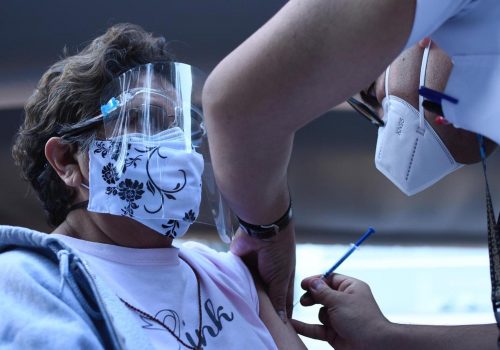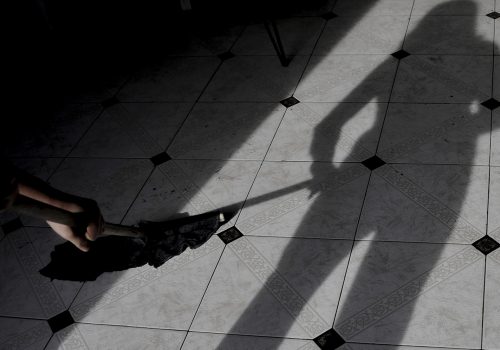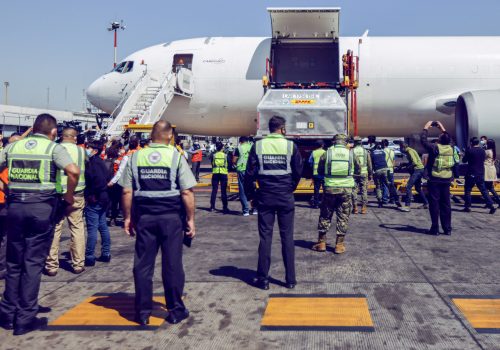FAST THINKING: A political ‘wake-up call’ for Latin America
JUST IN
Left turn ahead. Pedro Castillo, a socialist schoolteacher with no government experience, appears to have secured the presidency of Peru with an extremely close victory. As he prepares to take the reins amid political turmoil—as the country’s fourth president in less than a year, and with his opponent still challenging the results—where will Castillo take Peru? What does his victory mean for the Latin American left and global investors? Our experts break down how the barefoot candidate will govern.
TODAY’S EXPERT REACTION COURTESY OF
- Jason Marczak (@jmarczak): Director of the Adrienne Arsht Latin America Center
- Maria Fernanda “Mafe” Bozmoski (@mariabozmoski): Deputy director of the Adrienne Arsht Latin America Center
Adiós, elites
- Jason calls Castillo’s apparent victory over right-wing contender Keiko Fujimori, the daughter of a former president, a “wake-up call for many in the region’s political class.”
- That’s because Latin America has taken the world’s hardest economic hit from the pandemic. Peru has the world’s highest COVID-19 death rate per capita, but many of its neighbors are not far behind. Castillo’s “win, which few would have predicted months ago, exhibits the dramatic upheaval possible as countries continue to reel from the socioeconomic fallout of COVID-19,” Jason points out.
- Castillo led by 44,000 votes, out of 18.8 million, at the close of the count and has declared himself president-elect. But the electoral authorities can’t certify him as the winner until Fujimori’s various legal challenges are resolved. Even though foreign election observers have found no irregularities, Fujimori “will continue to challenge the result and cast doubt over Castillo’s legitimacy,” Mafe predicts.
- The election of the anti-establishment Castillo comes after months of mass protests and the impeachment and removal of President Martín Vizcarra last year. “In Peru as in the rest of the region, citizen anger and political fatigue are an explosive combination,” Mafe says. And it’s not over: Mafe points out that Peru’s vaccination drive has been waylaid by corruption and red tape, so the country should “expect continued protests and social unrest.”
Subscribe to Fast Thinking email alerts
Sign up to receive rapid insight in your inbox from Atlantic Council experts on global events as they unfold.

Radical or moderate?
- Castillo drew praise from the likes of Bolivia’s Evo Morales and ran as a candidate for the Peru Libre party, which “defines itself as Marxist-Leninist,” though Castillo is not technically a member of the party, Mafe tells us. She adds that Castillo has floated altering the country’s constitution, “although, to assuage detractors, his supporters say it is just one sentence at the end of his twelve-page government plan.”
- Jason notes that Castillo’s platform ahead of the first round of voting included nationalizing gas fields and instituting agrarian reforms, but he hedged on these policy proposals once he got into a one-on-one matchup with Fujimori.
- Castillo’s latest manifesto pledges “a progressive but truly democratic” government. But what that will amount to is hard to judge, Jason tells us, particularly considering that Castillo will not enjoy much support in Peru’s Congress, where his party will hold less than 30 percent of the seats. “How he governs and how he is allowed to govern remains a big question mark,” Jason says.
Finding his fiscal footing
- Domestically, job one will be combating COVID-19. But another early test, Jason says, will be how Castillo may approach renegotiating “contracts with mining firms—an industry that is crucial to the Peruvian economy.”
- When Castillo’s electoral victory came into focus, Peru’s stock market and currency exchange rate plunged as a result of anxiety among investors about his left-wing agenda, though the currency has rebounded in recent days. Will he seek to mollify investors’ concerns? “How he approaches international investors will set the tone for his relations with the United States,” Jason says. “But investors will remain skittish about Peru unless Castillo provides clear messaging of stability and the rule of law.”
- The United States often clashes with left-wing Latin American governments, and the developments in Lima are now raising the specter of another front in that struggle. Mafe notes, “A capitalist, free-market US may be at odds with Castillo’s vision for his country, as a candidate who has expressed admiration for Vladimir Lenin and Fidel Castro.”
Further reading
Wed, May 12, 2021
COVID-19 vaccine tracker: Latin America and the Caribbean
Issue briefs and reports By
Our interactive maps track the percentage of the population of each Latin American and Caribbean country covered by current vaccine agreements; the total number of doses secured by each country and breakdown by supplier/vaccine; where each vaccine is being used across the region; and how many vaccines flow from each major producing country to regional destinations.
Wed, Mar 31, 2021
The pandemic is a chance to reshape women’s roles in Latin America and the Caribbean
New Atlanticist By
The economic crisis triggered by the pandemic has had unequal consequences across Latin America and the Caribbean, with women disproportionately affected. But the pandemic is an opportunity for the region to reshape women’s roles in the economy, politics, and society.
Tue, Mar 16, 2021
COVID-19 Recovery in Latin America and the Caribbean: A Partnership Strategy for the Biden Administration
Issue briefs and reports By
The United States has the opportunity to position itself as the most important partner for its neighbors by supporting the region’s sustainable and inclusive recovery.
Image: Peru's presidential candidate Pedro Castillo addresses supporters from the headquarters of the "Free Peru" party in Lima, Peru, on June 15, 2021. Photo by Sebastian Castaneda/Reuters.


